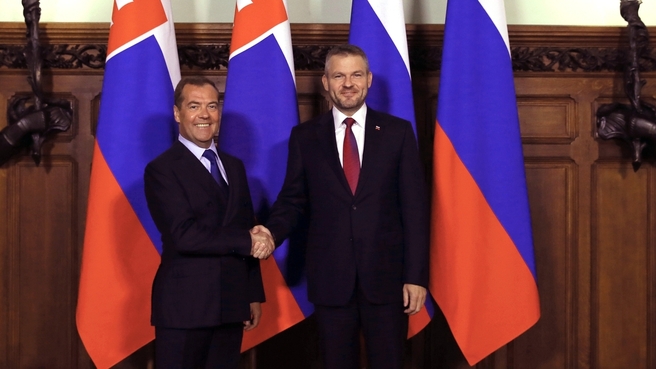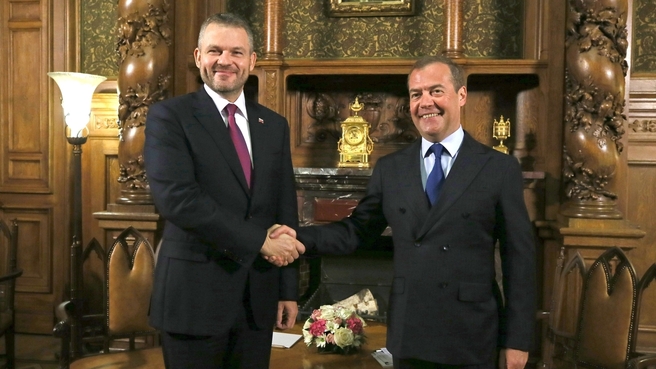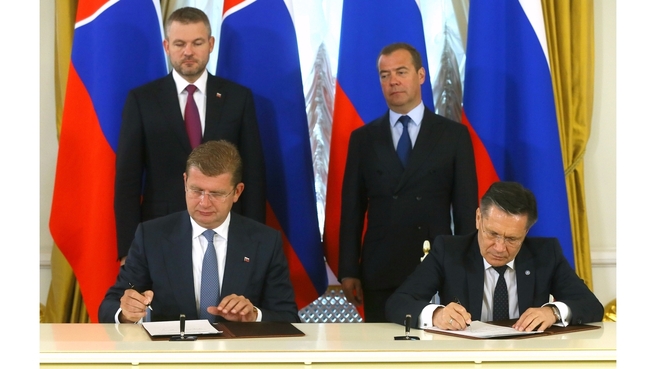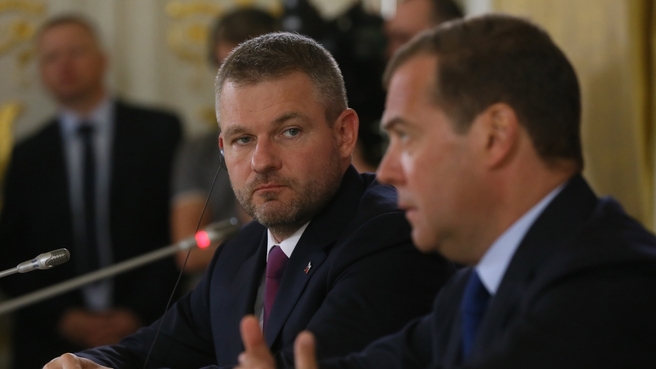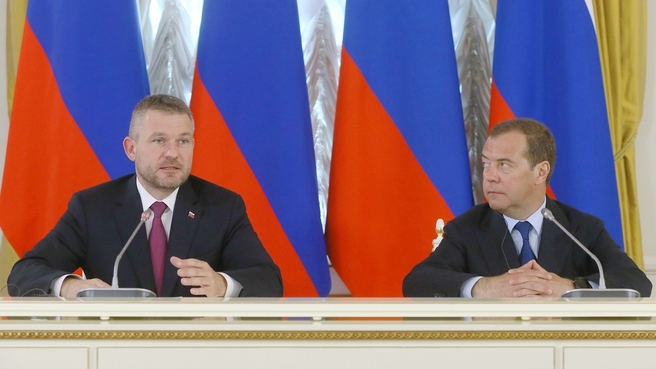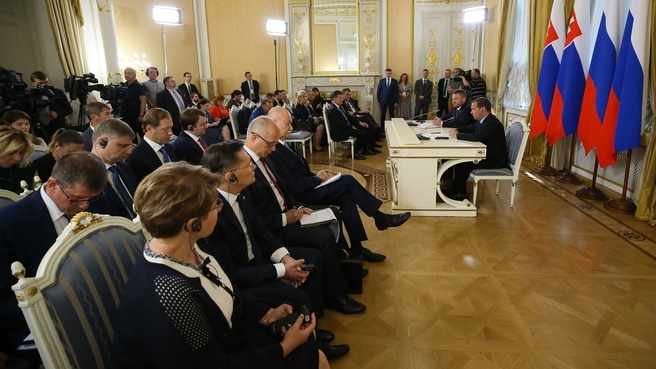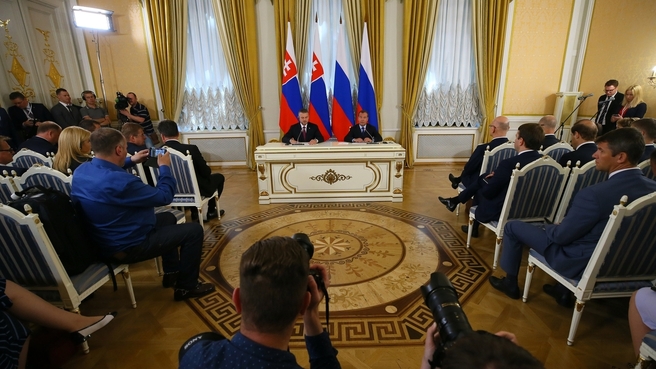Dmitry Medvedev held talks with Prime Minister of the Slovak Republic Peter Pellegrini.
Meeting with Prime Minister of Slovakia Peter Pellegrini
Documents signed following the talks
News conference by Dmitry Medvedev and Peter Pellegrini following the talks
Dmitry Medvedev’s meeting with Prime Minister of Slovakia Peter Pellegrini
Documents signed following the talks:
Memorandum
of Understanding between Rosatom State Corporation and the Ministry of Economy
of the Slovak Republic on Cooperation in the Use of Nuclear Energy for Peaceful
Purposes
Signed for Russia: Director General of Rosatom
State Corporation Alexei Likhachyov
Signed for Slovakia: Minister of Economy of
the Slovak Republic Peter Ziga
Appendix to the General Contract
between TVEL and the Slovak Slovenske Elektrarne
company for fuel supplies to Slovakia’s nuclear power stations for the period
from 2022 to 2030
Signed for Russia: TVEL President
Natalya Nikipelova
Signed for Slovakia: General
Director of Slovenske Elektrarne company Bronislav Stricek
News conference by Dmitry Medvedev and Peter Pellegrini following the talks
Excerpts from the transcript:
Dmitry Medvedev: Colleagues, media representatives, my colleague Peter Pellegrini and I had really good talks. It was a very useful conversation. We discussed the state of our relations and the interaction between our states. It must be said directly that these ties are making progress in various fields despite the well-known political situation that did not help relations in recent years.
Specifically, if we are speaking about the economy, we have managed to cope with the decline in bilateral trade. During the first four months of this year, the volume of Russian-Slovak trade increased by about one-quarter. Incidentally, it was growing last year as well. During the first four months, bilateral trade reached about $2 billion. This trend should be consolidated to return to at least the 2012-2013 level. This is happening on the basis of a qualitative improvement in the pattern of trade, moving the production of Slovak companies’ goods to the Russian Federation, and a number of other solutions.
We discussed energy. I think there will be more questions about this. Nevertheless, I would like to stress that Slovakia can count on Russia as a reliable supplier of hydrocarbons in the future. We have a good legal infrastructure to support this, a good history of relevant agreements, and a good history when it comes to their implementation. We have just signed nuclear power agreements that are, in my view, highly beneficial and helping to strengthen this cooperation.
Other priorities include industrial cooperation and transport. There is a well-known project to build a wide-gauge railway track from Košice to Vienna. This is a major project that has been in the making for quite a while, but its coordination still has to be finalised.
Relations between our countries are not limited to the economy. We have a packed programme of cultural cooperation. We have just talked about this during the negotiations. It is also gratifying that the number of people learning Russian in Slovakia is on the rise again. This is a good basis for interaction in the future. The geography of language training is also expanding. Our countries have a lot of positive experience when it comes to student and scientific exchanges. Russian students are going to Slovakia to carry out their studies. Slovak students are being trained in Russia. The number of scholarships has also increased lately. We have agreed with Mr Prime Minister to support projects of this kind.
I would like to note in particular and express our gratitude to the Slovak leaders, local authorities and, of course, all the residents of Slovakia for their sensitivity to the memory of our soldiers, Red Army soldiers, as well as for their solicitous maintenance of military graves and memorials, where over 60,000 Russian citizens, who gave their lives [for Slovakia], rest in peace. I am sure that respecting the past in such a way is a reliable basis for neighbourly relations in the future.
Peter Pellegrini (in Russian): Thank you, Mr Prime Minister.
(Retranslated): We had very open and friendly negotiations. We would like to thank you for the very open dialogue between our ministers and delegations.
The Slovak Republic has one of the most open economies in the world. Therefore, it is and has always been vital for us to have well-balanced political relations with all countries. And I would like to make it quite clear that in the future Slovakia would like to have a friendly, mutually beneficial and respectful relationship with the Russian Federation, which is built on pragmatic cooperation and trust, as this is necessary for modern countries in the 21st century.
The Russian Federation is one of Slovakia’s most important economic and trade partners and we believe that our economic and trade relations have a vast potential.
Mr Prime Minister noted that after the decline of our trade relations things are now starting to pick up again returning to the previous level and we have noted this improvement.
It is not only the economy and the energy industry that we are working together in, although the latter plays a key role in our relations. In addition to our collaboration in the field of education, the number of tourists is on the rise and many more people are paying visits to Russia and Slovakia.
As we have already pointed out, we are going to be seeing a lot more Slovaks visiting Russia and vice versa.
I would like to thank you, Mr Prime Minister, for noting that the security of the Slovak Republic’s energy will in no way be threatened in the future. This is good news for the people of Slovakia and for Slovak companies. I would like to thank you as the head of the Government for this clear-cut pragmatic position.
I also spoke about my desire to push ahead with the broad-gauge railway track project. We would like to continue being an important country when it comes to the field of transport, playing the same role as in the transit of gas and oil. We would like this project to proceed and transport to be the next stage of our cooperation.
I would also like to note that Russia is a good energy partner for Slovakia and we reciprocate by fulfilling our contractual commitments to the Russian Federation. We are very glad that the Slovak Power Stations (Slovenske elektrarne) signed a contract with the TVEL Fuel Company, which is worth 630 million Euros.
We hope this will also stabilise our energy industry because nuclear power makes up a great portion of our energy generation.
I would like to thank you for receiving us and for having an opportunity to meet during my visit not only with Prime Minister Dmitry Medvedev and his colleagues but tomorrow with President of the Russian Federation Vladimir Putin. As the prime minister, I had the privilege of speaking within the framework of the main discussion panel at the St Petersburg International Economic Forum. I will also meet with the UN Secretary-General, Mr Putin and other leaders. This is a great honour for us. Mr Prime Minister, I would like to thank you for this and our constructive talks.
I would like to mention that I have invited Mr Prime Minister to visit Slovakia for the 75th anniversary of the Slovak national uprising, if his working schedule allows for this. The Red Army played an outstanding role in liberating Slovakia, and Slovakia and its people will never forget this feat.
Thank you very much.
Question: Lana Samsoniya, Interfax. This question is for you, Mr Pellegrini. Last month, you and President Trump spoke out against the Nord Stream 2 project and supported reverse-flow gas supplies to Ukraine. Slovakia is actually earning good money on reverse-flow gas supplies to Ukraine. I would like to know if the main reason for you doing so is the fact that this project is unprofitable for Slovakia, or are there any other reasons?
Mr Medvedev, did you discuss the linking between the contract with Ukraine and the Nord Stream project?
Peter Pellegrini (retranslated): The position of Slovakia on the Nord Stream 2 project has a reason of its own. Yes, initially this project had the capacity of changing existing gas supplies from Russia to Europe, and, of course, (we have stated this openly), this may have a significant impact on the infrastructure that goes through Slovakia. Based on this understanding, the Slovak Republic has adopted this position.
On the other hand, we are looking for opportunities to use the existing Slovak infrastructure and include it in gas transit in case Nord Stream 2 becomes operational. Also, the Slovak Republic is looking for opportunities for our transit infrastructure to be included in gas supplies, which, in the future, will go through our territory as part of the TurkStream. If Slovakia could find opportunities for cooperation in the first and the second case, it would alleviate any economic ramifications. Of course, it would not be good if our territory were left out from this supply system. You should realise that it has economic reasons for us. We must deal with this matter very seriously. Today, we listened to the positions of the ministers and the Prime Minister of the Russian Federation.
Dmitry Medvedev: I would like to say a couple of words here, since the question was addressed to me as well. Each state should take care of its own economic interests, and we understand Slovakia’s concern about what will happen to transit revenue in the event the corresponding transit and deliveries from Russia to Europe through Ukraine stop. Here is what I told the Prime Minister and what would I like to say here again.
First (we have spoken about this many times, and Mr Pellegrini just confirmed it), we need to find overlapping interests and mutually beneficial spheres of cooperation regarding connecting Slovakia to the Nord Stream 2 gas pipeline and the TurkStream as well. This kind of discussion between our respective ministers is already underway, and we spoke about it today as well. Once again, we are inviting our friends and partners from Slovakia to participate in this project.
With regard to transit supplies across Ukraine, I have spoken several times on this subject recently. Once again, I will state my position publicly. We did not refuse to renew the corresponding contracts with Ukraine or to use this transit route. However, this cooperation must be pragmatic and be based on normal commercial relations. It should be mutually beneficial. There must be reasonable rates in place. Of course, this cooperation should expand if the necessary circumstances are in place, such as all kinds of endless legal disputes that lead nowhere other than a blind alley must be dropped, Ukraine’s gas transport system management must be figured out and a variety of other issues must be addressed as well. We hope that the new Ukrainian leadership will stick to a pragmatic approach in this regard in order to achieve normal agreements based on pragmatism, and this approach will prevail over all sorts of political speculations. This transit will remain in place then.
Question: I would like to ask you about the broad-gauge railway track project. Are there any specific deadlines? What in particular did you discuss? Are there alternatives to broad-gauge railway tracks?
Peter Pellegrini: The project to extend the broad-gauge railway to Bratislava and Austria requires a huge investment of about $8 billion. This is the first point.
The Minister of the Economy and the Russian Railways CEO spoke about the growing need to transport more goods from the East to the West. Many facts show that it is necessary to expand the broad-gauge railway.
Today, the Slovak Republic has expedited this process. We discussed its impact on the environment and are now approaching the point when the Slovak Republic must set aside in a special fund (these are assets that have no influence on the deficit) substantial sums by agreement with its Austrian and Russian partners so that we can start getting capital for this project since we need to get funds at financial markets.
This project is expected to generate much profit, and for this reason large financial institutions are also interested in it. I am very glad that the Prime Minister and the Russian Railways Chief Executive Officer appreciated the changes in the dynamic on the Slovak part. This is very important for the citizens of the Slovak Republic.
Other countries are also greatly interested in this project. We hope this route will do through Slovakia, as it could go through Poland and Hungary. We must fight for it to pass through Slovakia and to gain a third strategic transport corridor in our region, where we make it very clear that we want to be an integral part of this project. And the Slovak Republic will do all it can to implement this project as soon as possible. The environmental impact statement and route location should be finalised next year, and we need to start gradually implementing it. This will take more than a year or two but the construction should get underway and produce major economic results for us. You can imagine how important this project was during the global economic crisis and what it means today.
Question: Rossiyskaya Gazeta, Vladimir Kuzmin. Russian-Slovak cooperation has been ongoing for many decades. The railway idea is also a decade old or probably older. Did you discuss any new promising areas for cooperation – some specific projects that could supplement rather that overlap existing ones? This is a question for both prime ministers.
Dmitry Medvedev: You have seen our cooperation grow, for instance in nuclear energy. We have just signed two very important and serious documents that provide, first, for the development of these relations in the future, and, second, for long term fuel supplies by the Russian company that are worth a substantial amount. This is a good area for cooperation.
Of course, we discussed other issues as well. Let me recall that, aside from the broad-gauge railway and gas, we have projects in other areas. This includes various manufacturing lines that have been launched in Russia and investment in the Slovak Republic.
If I am correct, 60 joint ventures with Slovakian capital are operating in Russia, and there are 120 companies with Russian capital in Slovakia. This is quite an impressive amount. Not all of these companies are large but that’s a good thing. As a rule, the wellbeing of our economies depends on the cooperation of giants but it is important for small and medium sized companies to organically blend into the fabric of economic cooperation. This is good. I hope cooperation in this area will continue. Yes, in the past few years we have lost some of our trade volume, but we did managed to increase it last year. I give credit for this to the government of the Slovak Republic. Of course, we also tried to facilitate this process despite the sanctions and restrictions that still exist and, regrettably, do not help develop relations. This affected our work.
In the final count, we consider important and appreciate the fact that despite the complications, we are the third largest trade partner for the Slovak Republic after Germany and the Czech Republic. And this is very important for the future of our relations.
Peter Pellegrini (retranslated): With your permission I would like to recall one more specific field that we can talk about sincerely and openly: the Russian Federation, the Russian Aircraft Corporation MiG will take care of the combat ability of our aviation in the next four or five years. I am referring to the MiG-29 that can protect the air space of the Slovak Republic. A contract worth about 100 million euros will be signed soon.
There are other specific areas that we can tell you about and where our cooperation with the Russian Federation is very active. Naturally, we see huge potential in storing gas in the Slovak Republic. Slovakia has Europe’s largest underground gas depots, that are partially used by Gazprom, and we have given Gazprom an opportunity to store more gas in them. This is also an area where we cooperate, and this is specific and for the future.
Question (retranslated): Slovak television. Good afternoon. Mr Medvedev, our Prime Minister invited you to attend the 75th anniversary of the Slovak National Uprising. Will you have the time to attend these celebrations next August?
Dmitry Medvedev: Of course, I would like to thank the Prime Minister, my colleague for this invitation. I was pleased to receive it. To be honest, I am not ready to answer this question now. I must review my schedule. That said, we understand the importance of this event and will do all we can for Russia to be represented at a high level.
